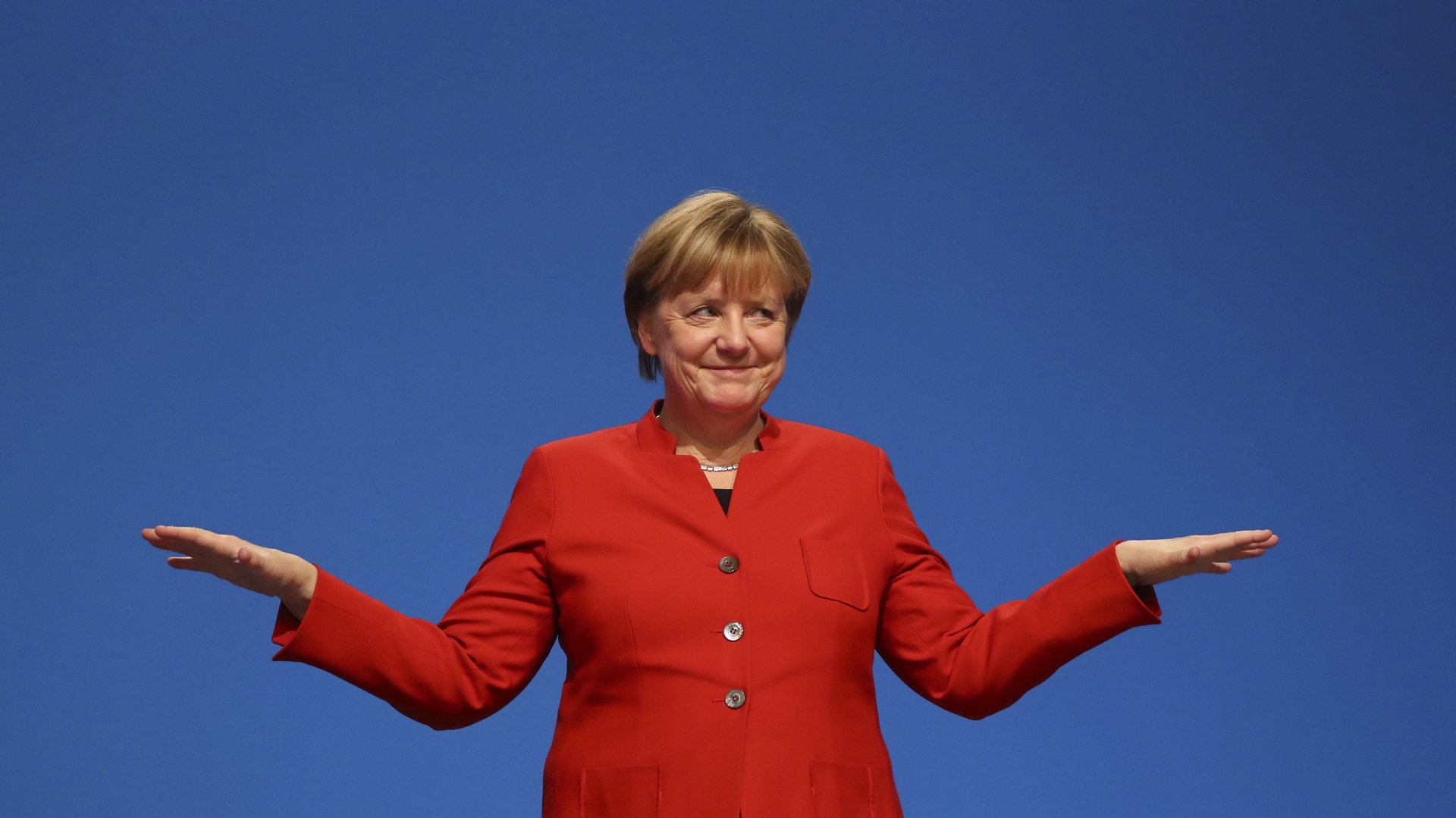Germany’s election campaign is a snooze—just the way Merkel likes it
When Martin Schulz returned to Germany last year after a long career at the European Parliament in Brussels, the center-left Social Democrats (SPD) welcomed him home like a long-lost son. For a brief time, “Schulzmania” ruled, with many in the media predicting this was the man who could give chancellor Angela Merkel a run for her money in the Sept. 24 federal election.


When Martin Schulz returned to Germany last year after a long career at the European Parliament in Brussels, the center-left Social Democrats (SPD) welcomed him home like a long-lost son. For a brief time, “Schulzmania” ruled, with many in the media predicting this was the man who could give chancellor Angela Merkel a run for her money in the Sept. 24 federal election.
It didn’t last. The Schulz euphoria has long worn off and his party is now polling at about 24%, versus Merkel’s center-right Christian Democratic Union, which is hovering around 38%.
“It’s a bit like David and Goliath, but David has forgotten to bring his slingshot,” says Gero Neugebauer, a political scientist at the Free University of Berlin. “You see it in the way that he [Schulz] attacks, it’s very cautious, and one reason for that is because Merkel has this ‘elder statesman’ image. She has so many achievements that it is difficult to prove that she has made any mistakes or that she doesn’t know everything.”
The lack of a truly spirited fight between the two likeliest candidates for chancellor makes Germany’s election campaign—coming after momentous, surprising votes in France, the UK, and the US—seem rather lackluster. This, in fact, is Merkel’s strategy. It’s called “asymmetric demobilization” in German political circles.
Merkel’s campaign in 2013 also followed this strategy, says Neugebauer. By ensuring there were no hot-button topics that her opponents could seize upon, it meant potential supporters of other parties thought the differences between the main parties weren’t that big, so they may as well vote for Merkel since she already has the experience.
“The idea with asymmetric demobilization is that you keep political discussion generally at a low-level in order to not provide any point of entry or attack for the opponent,” says Carsten Nickel, managing director at Teneo Intelligence. “She cashes in on topics that the SPD would otherwise claim for themselves.”
Take gay marriage. Merkel not only whisked it out of the SPD’s hands by opening it to a free vote in the parliament—it passed comfortably—but then she actually voted against it herself, placating the stricter conservatives in her party.
In another deft step, she has made outrage about the diesel emissions-cheating scandal her own, expressing annoyance and disappointment with German auto chiefs for covering up years of wrongdoing. From the massive scandal at Volkswagen, to the industry-wide cartel allegations, and the revolving door between the German government and the car industry… all of it happened on Merkel’s watch, and yet she has mostly avoided being taken to task for that so far.
Familiarity and contempt
Some worry that Merkel’s neutralizing campaign methods arguably suffocate robust democratic debate and lull voters into of apathy. “There are people who are fed up with Merkel, she’s been there too long,” Neugebauer says. “They’re looking for an alternative but not finding it, and then they vote without any enthusiasm.”
There is long list of things that are not being debated in great depth during the campaign: globalization, the big gap between rich and poor, the country’s low wages, its role in Europe, the refugee situation, and more. ”In as far as discussion is a necessary prerequisite for democracy, then this isn’t a high point,” Neugebauer says.
Refugee policies are currently playing a much less important role in the campaign than might have been expected, given that the country has taken in more than 1 million refugees over the past few years. But a Statista survey in July showed German voter’s top three concerns (link in German) were old-age pensions, social security, and crime and terrorism.
Beneath the surface, there is some anger towards Merkel among citizens who think she rode roughshod over their concerns about integrating so many immigrants, and she has been heckled at recent campaign events because of it.
“The topic is still smoldering in the background and for me this is one of the wildcards to look for,” says Nickel of Teneo Intelligence. The far-right, anti-migrant, anti-Muslim Alternative for Germany party (AFD) is currently polling level with more established parties like the Greens, the Free Democrats, and the Left. A large share of voters still say they are undecided, and Nickel notes that “many people might not admit in a poll that they would vote for the AFD.”